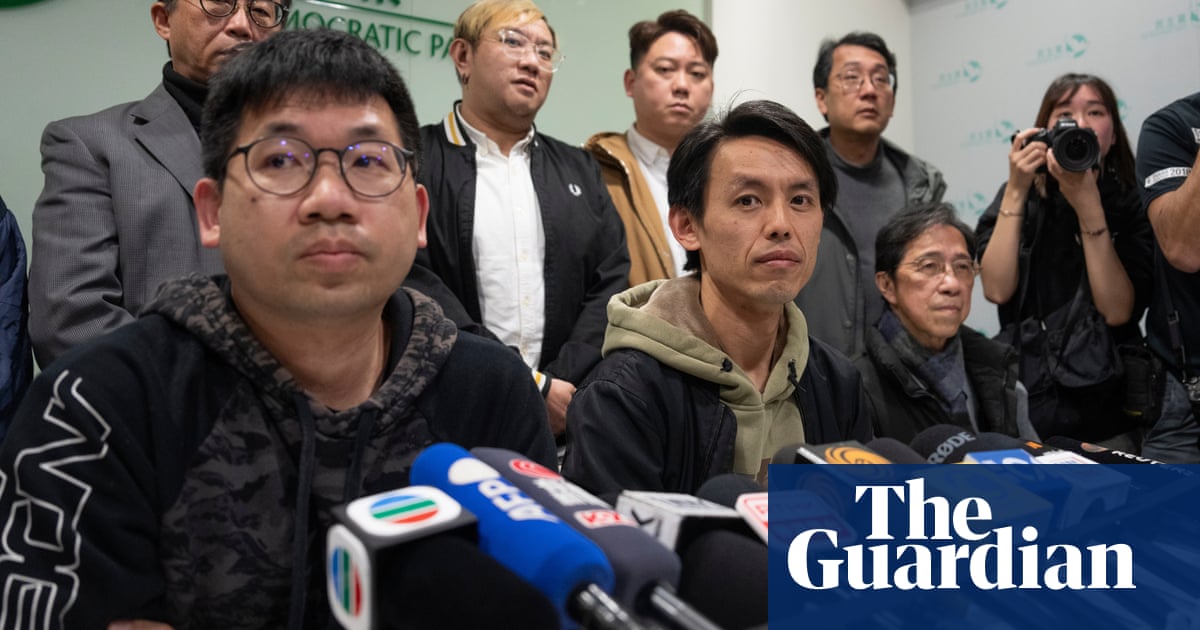Hong Kong’s oldest pro-democracy party, which became an influential voice of opposition before Beijing cracked down on dissent, will start preparations to shut down, its leader has said.
Lo Kin-hei, the chair of Hong Kong’s Democratic party, said on Thursday: “We are going to proceed and study on the process and procedure that is needed for the disbanding.”
Lo told reporters: “We considered the overall political environment in Hong Kong and all those future plans that we can foresee, and that is the decision that we make.”
Lo said the final decision to dissolve the party must be left to a members’ vote, but did not say when that would take place.
The Democratic party was founded in 1994, near the end of British colonial rule, when Hong Kong’s leading liberal groups merged. Early leaders of the Democratic party played a key role in shaping “one country, two systems”, a constitutional arrangement that promised Hong Kong a high degree of autonomy and rights protections.
After the city was handed over to China in 1997, the party became the most influential voice of opposition in Hong Kong’s legislature and led peaceful street demonstrations. The party’s fortunes declined after Beijing tightened its grip and imposed a national security law in Hong Kong, after huge and sometimes violent pro-democracy protests in 2019.
“Developing democracy in Hong Kong is always difficult,” Lo said on Thursday. In recent years “we see a lot of civil society groups or political parties disbanding”, he added.
Asked whether the democrats were pressured by Beijing to fold, Lo said he would not disclose details of internal discussions.
Four of the party’s ex-lawmakers – including the former party leader Wu Chi-wai – are serving prison sentences after being found guilty of subversion under the national security law last year.
The party no longer holds any legislature seats after Hong Kong changed its electoral system in 2021 to ensure only “patriots” can take office.
Emily Lau, a former legislator who has been with the Democratic party since its inception, said the development came as a shock. “We only had an AGM in December and we elected a new central committee … There was no sign there was no enthusiasm or money. Everyone knew the difficulties,” she said.
Lau noted several parties had shut down since the crackdown on Hong Kong’s pro-democracy movement, suggesting the last signs of the “one country two systems” regime were being crushed. “It must show that freedom of association and expression and all that is a thing of the past.”
Asked about the Democratic party’s legacy, Lau said: “Some Hong Kong people have very fond memories of the party and we have tried hard to work for the people and speak for the people. I’m not saying we’re the best, but we were one of the biggest and now we have no seats. It’s very sad.”
A three-person team that includes Lo will look into the legal and accounting rules on party dissolution, as the start of a multi-step process. The group has 400 members and is not experiencing acute financial stress, according to Lo.
A vote to dissolve the party will require the support of 75% of meeting participants.
Lo said he hoped Hong Kong could return to values such as “diversity, inclusion and democracy” that underpinned its past success.
Well-known figures from the party include Martin Lee – hailed by some as Hong Kong’s “father of democracy” – as well as Albert Ho, who organised annual vigils to mark the 1989 Tiananmen Square crackdown.
Western nations including the US have criticised Hong Kong for curtailing rights. City officials say the security laws are needed to restore order.
Hong Kong’s second-largest opposition group, the Civic party, dissolved in 2023.
Agence France-Presse contributed to this report










